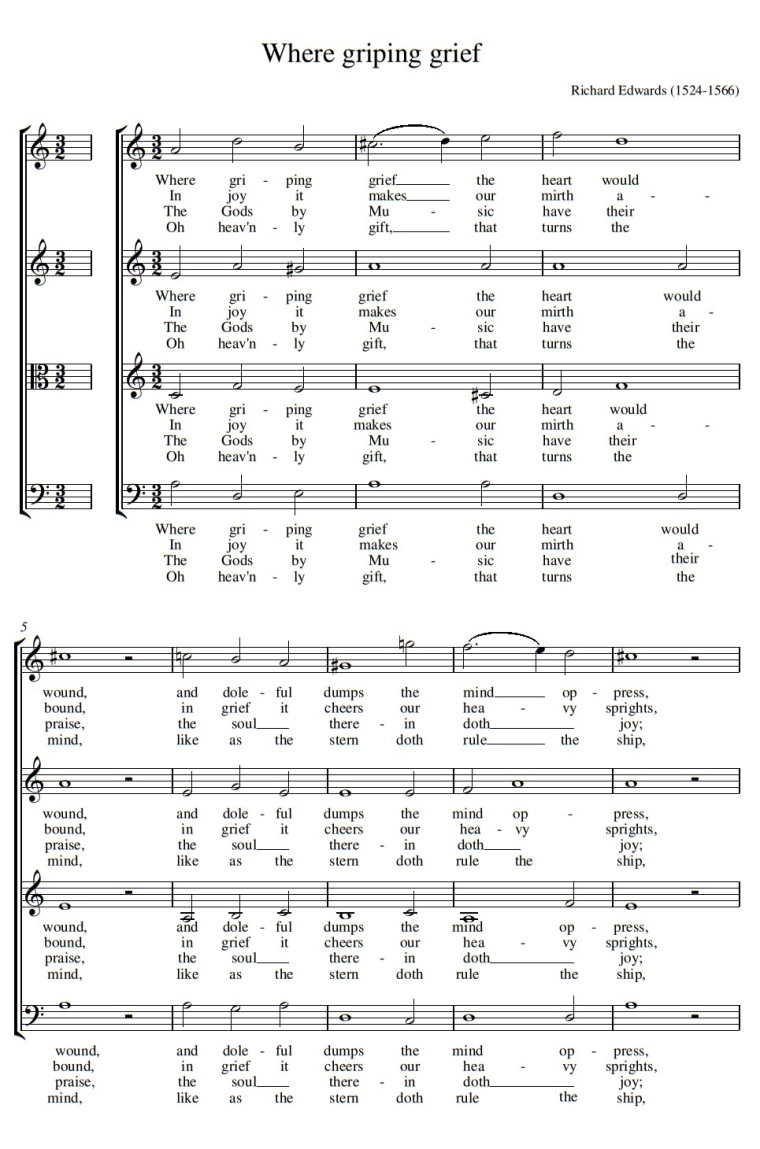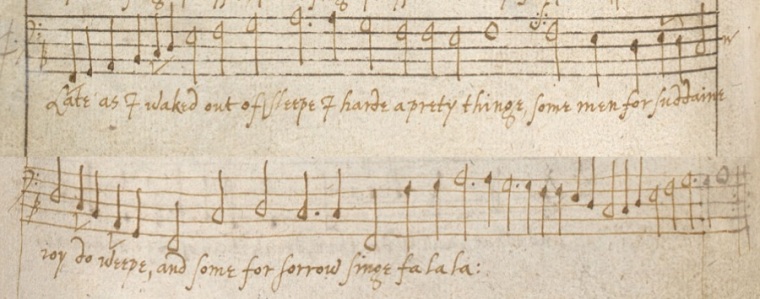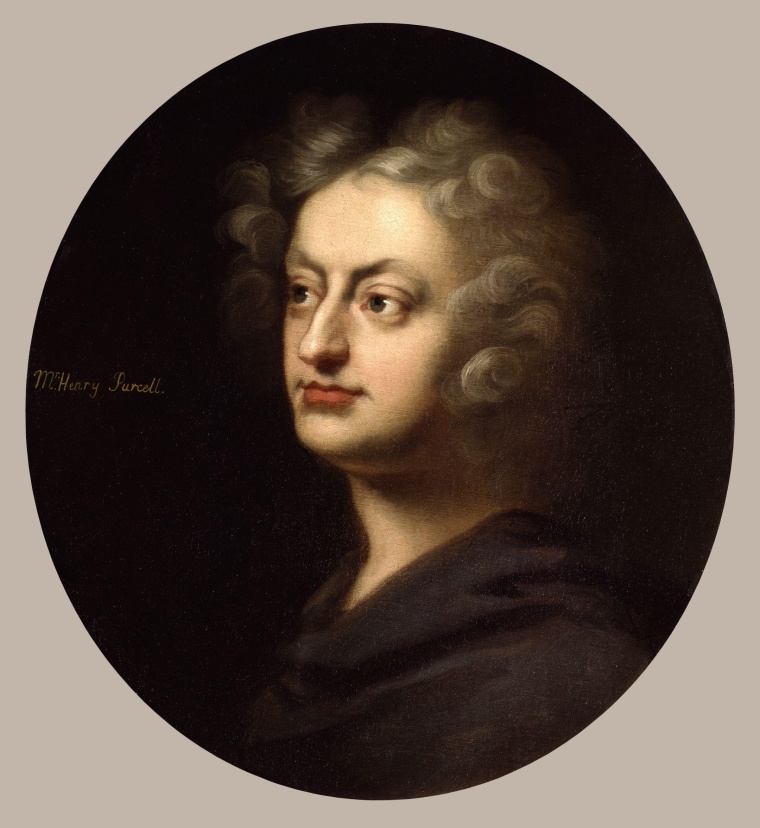 English translation: please click here.
English translation: please click here.
Il suon d’argento
Anonimo (probabilmente Richard Edwardes, 1525 - 1566): Where griping grief. Versione per voce (soprano) e liuto: Emma Kirkby e Anthony Rooley. Versione a 4 voci: Deller Consort.
Where griping grief the heart would wound
And doleful dumps the mind oppress,
There music with her silver sound
Is wont with speed to give redress
Of troubled minds, for ev’ry sore,
Sweet music hath a salve in store.
In joy it makes our mirth abound,
In grief it cheers our heavy sprites,
The careful head relief hath found,
By music’s pleasant sweet delights;
Our senses, what should I say more,
Are subject unto Music’s law.
The gods by music have their praise,
The soul therein doth joy;
For as the Roman poets say,
In seas whom pirates would destroy,
A dolphin saved from death most sharp,
Arion playing on his harp.
O heavenly gift, that turns the mind,
Like as the stern doth rule the ship,
Of music whom the gods assigned,
To comfort man whom cares would nip,
Since thou both man and beast doth move,
What wise man then will thee reprove.
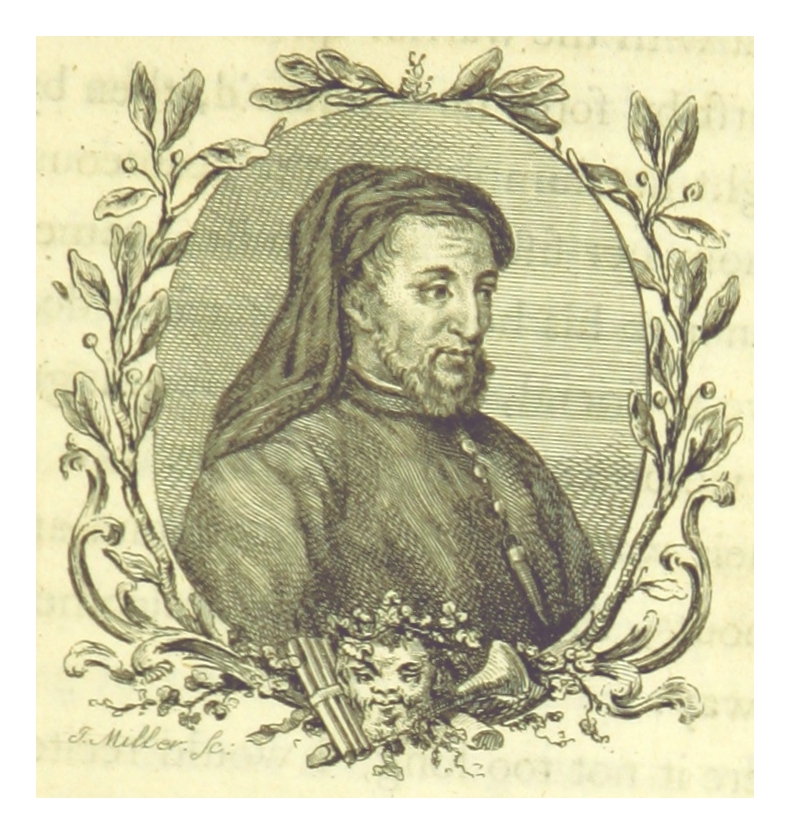 Forse figlio illegittimo di Enrico VIII, Richard Edwardes fu poeta, autore drammatico, gentiluomo della Chapel Royal e maestro del coro di voci bianche della medesima istituzione sotto le regine Maria e Elisabetta I. Nei suoi ultimi anni compilò un’ampia silloge di testi poetici di autori diversi, cui aggiunse, firmandoli, alcuni componimenti propri, e fra questi appunto Where gripyng grief, con il titolo In commendation of Musick. La raccolta, intitolata The Paradise of Dainty Devices, fu pubblicata postuma nel 1576, a cura di Henry Disle; dei molti volumi miscellanei dati alle stampe in quel periodo fu il più fortunato, tant’è vero che fu ristampato nove volte nei successivi trent’anni.
Forse figlio illegittimo di Enrico VIII, Richard Edwardes fu poeta, autore drammatico, gentiluomo della Chapel Royal e maestro del coro di voci bianche della medesima istituzione sotto le regine Maria e Elisabetta I. Nei suoi ultimi anni compilò un’ampia silloge di testi poetici di autori diversi, cui aggiunse, firmandoli, alcuni componimenti propri, e fra questi appunto Where gripyng grief, con il titolo In commendation of Musick. La raccolta, intitolata The Paradise of Dainty Devices, fu pubblicata postuma nel 1576, a cura di Henry Disle; dei molti volumi miscellanei dati alle stampe in quel periodo fu il più fortunato, tant’è vero che fu ristampato nove volte nei successivi trent’anni.
Del testo si trovano, anche nel web, numerose varianti, quasi tutte di poco conto, a cominciare da «When… Then…» invece di «Where… There…» nella prima strofa; ma è chiaramente un errore l’«Anon» che non di rado sostituisce «Arion» all’inizio dell’ultimo verso della terza strofa: Edwardes fa infatti riferimento a Arione di Métimna, l’antico citaredo che secondo Erodoto inventò il ditirambo e che, racconta il mito, si salvò da sicura morte in mare lasciandosi portare a riva da un delfino che aveva ammaliato con il canto.
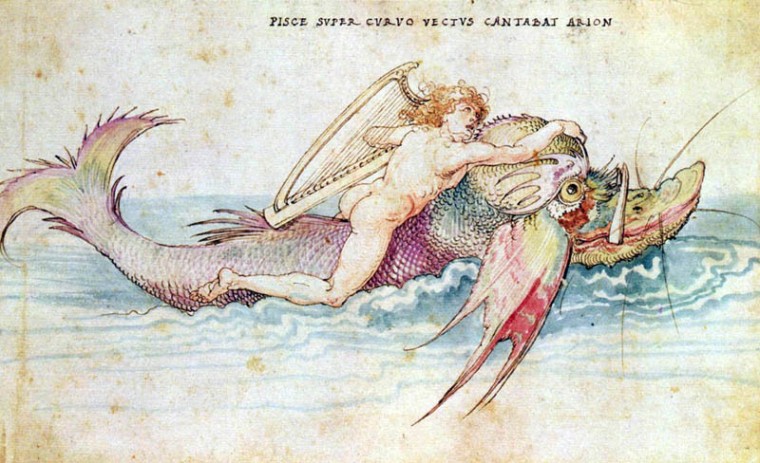
Le due fonti manoscritte che ci hanno tramandato la musica di Where griping grief (il Mulliner Book, raccolta di composizioni per strumento a tastiera databile fra il 1550 e il 1585 circa; e il Brogyntyn Lute Book, c1595) non riportano né il testo né il nome dell’autore: si ritiene probabile che anche la musica sia dello stesso Edwardes. La melodia è finemente cesellata; pur procedendo prevalentemente per gradi congiunti, presenta non pochi intervalli più ampi, fra cui un’insolita (per l’epoca) ottava diminuita — sulle parole «dumps the» nel secondo verso della prima strofa.
Il brano doveva essere abbastanza noto all’epoca di Shakespeare, perché questi lo cita in una scena di Romeo e Giulietta. Alla fine del IV atto, dopo che la Nutrice ha rinvenuto il corpo esanime della giovane Capuleti e un cupo inatteso dolore strazia i suoi familiari, alcuni musicisti, che erano stati convocati per allietare la festa delle nozze di Giulietta con il conte Paride, ripongono mestamente gli strumenti e stanno per andarsene quando sopraggiunge Pietro (servitore della Nutrice) e chiede ai musici di suonare per lui; gli altri rispondono che non è il momento adatto per far musica, sicché Pietro inizia a battibeccare con loro e infine, citando Where griping grief, trova il modo di insolentirli. La scena consiste in una lunga serie di giochi di parole a sfondo musicale, da alcuni critici considerati di bassa lega — tanto che qualche traduttore italiano ha pensato bene di omettere l’intero passo. Ma secondo me la scena non è affatto priva di interesse, ragion per cui la riporto qui di seguito: a sinistra l’originale inglese, a destra non esattamente una traduzione, ma piuttosto una reinterpretazione, con alcune esplicite allusioni a musiche famose ai tempi del Bardo e già note ai frequentatori di questo blog.
|
PETER
Musicians, O musicians, Heart’s Ease, Heart’s Ease. O, an you will have me live, play Heart’s Ease. |
PIETRO
Musici, o musici, Chi passa, Chi passa. Se volete ch’io viva, suonate Chi passa. |
|
FIRST MUSICIAN
Why Heart’s ease? |
1° MUSICO
Perché Chi passa? |
|
PETER
O musicians, because my heart itself plays My Heart is Full. O, play me some merry dump to comfort me. |
PIETRO
O musici, perché il mio cuore sta danzando un passamezzo che non passa. Prego, suonate qualche allegro lamento per confortarmi. |
|
FIRST MUSICIAN
Not a dump, we. ‘Tis no time to play now. |
1° MUSICO
No, niente lamenti. Non è il momento di suonare. |
|
PETER
You will not then? |
PIETRO
Non volete suonare? |
|
FIRST MUSICIAN
No. |
1° MUSICO
No. |
|
PETER
I will then give it you soundly. |
PIETRO
Allora ve le suonerò io, sentirete. |
|
FIRST MUSICIAN
What will you give us? |
1° MUSICO
Che cosa sentiremo? |
|
PETER
No money, on my faith, but the gleek. I will give you the minstrel. |
PIETRO
Oh, non un tintinnar di monete, ve l’assicuro, ma piuttosto una canzon…atura. Ecco, vi tratterò da menestrelli. |
|
FIRST MUSICIAN
Then I will give you the serving creature. |
1° MUSICO
E allora noi ti tratteremo da giullare. |
|
PETER
Then will I lay the serving creature’s dagger on your pate. I will carry no crotchets. I’ll re you, I’ll fa you. Do you note me? |
PIETRO
E allora riceverete la sonagliera del giullare sulla zucca. Vi avevo chiesto lamenti e mi date capricci. Così ve le suonerò: prendete nota. |
|
FIRST MUSICIAN
An you re us and fa us, you note us. |
1° MUSICO
Se ce le suoni, prenderemo davvero le tue note. |
|
SECOND MUSICIAN
Pray you, put up your dagger and put out your wit. |
2° MUSICO
Per favore, riponi la tua sonagliera e va’ adagio. |
|
PETER
Then have at you with my wit. I will dry-beat you with an iron wit and put up my iron dagger. Answer me like men. (sings) When griping grief the heart doth wound And doleful dumps the mind oppress, Then Music with her silver sound— Why «silver sound»? Why «Music with her silver sound»? What say you, Simon Catling? |
PIETRO
Andrò a mio agio e vi metterò a disagio. I miei adagi non sono meno pesanti della sonagliera. Rispondete dunque, da uomini, ai miei colpi. (canta) Quando ferisce il cuore arduo tormento E la mente grava penoso tedio, Allora Musica dal suon d’argento… Perché «suon d’argento»? Perché dice «Musica dal suon d’argento»? Tu che ne dici, Simon Cantino? |
|
FIRST MUSICIAN
Marry, sir, because silver hath a sweet sound. |
1° MUSICO
Diamine, signore, perché l’argento ha un dolce suono. |
|
PETER
Prates. What say you, Hugh Rebeck? |
PIETRO
Ciance. E tu che dici, Ugo Ribeca? |
|
SECOND MUSICIAN
I say, «silver sound» because musicians sound for silver. |
2° MUSICO
Dico: «suon d’argento» perché i musicisti suonano per guadagnarsi dell’argento. |
|
PETER
Prates too. What say you, James Soundpost? |
PIETRO
Ciance anche queste. E tu, Giaco Bischero? |
|
THIRD MUSICIAN
Faith, I know not what to say. |
3° MUSICO
In fede mia, non so che dire. |
|
PETER
Oh, I cry you mercy, you are the singer. I will say for you. It is «Music with her silver sound» because musicians have no gold for sounding. (sings) Then Music with her silver sound With speedy help doth lend redress. (exit) |
PIETRO
Oh, ti chiedo scusa: tu sei quello che canta. Be’, risponderò io per te: dice «Musica col suon d’argento» perché i musicisti non hanno mai oro da far risonare. (canta) Allora Musica dal suon d’argento Con lesto soccorso pone rimedio. (esce) |
|
FIRST MUSICIAN
What a pestilent knave is this same! |
1° MUSICO
Che pestifero furfante è costui! |
|
SECOND MUSICIAN
Hang him, Jack! Come, we’ll in here, tarry for the mourners and stay dinner. (exeunt) |
2° MUSICO
Lascialo perdere! Venite, entriamo: aspetteremo quelli che verranno per il funerale e ci fermeremo a pranzo. (escono) |
